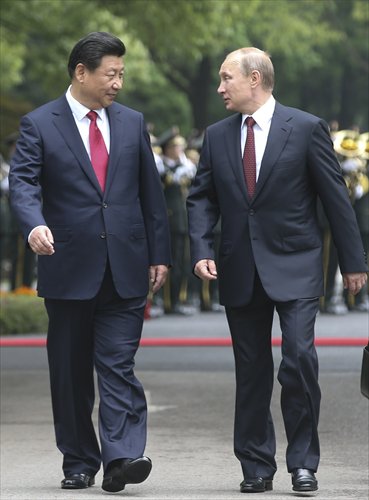Negotiations ongoing for long-awaited gas deal

Chinese President Xi Jinping welcomes Russian President Vladimir Putin before their talks in Shanghai on Tuesday. Photo: Xinhua
Chinese President Xi Jinping and Russian President Vladimir Putin's meeting Tuesday yielded a "substantial" joint statement, which vowed to push the all-round strategic partnership to a "new phase," though the two countries have yet to finalize a key gas supply agreement.
The trip to Shanghai marks Putin's first state visit to China after Xi took office last year.
Following their meeting, the two leaders witnessed the signing of a series of deals in fields including trade, energy, aviation and aerospace.
A comprehensive energy partnership was highlighted in the joint statement signed by Xi and Putin, as the two agreed to jointly develop coal mines in Russia and consider jointly building power plants in Russia to increase power supply to China.
Russia's second largest gas producer Novatek signed an annual 3 million-ton liquefied natural gas deal with China National Petroleum Corp (CNPC) on Tuesday.
However, the two sides failed to seal a highly anticipated gas supply deal between Gazprom and CNPC Tuesday, which was widely considered to crown the visit.
The deal, once settled, will see 38 billion cubic meters of natural gas piped annually from Russia to China for 30 years, and is seen as Russia's attempt to transfer its energy export focus away from Europe under the current tension.
With the price for gas still the major obstacle, a compromise is being sought so "the contract can be signed on a mutually beneficial basis," Gazprom CEO Alexei Miller said Tuesday, according to a Gazprom press release.
Senior Russian leaders, including Prime Minister Dmitry Medvedev and Energy Minister Alexander Novak, Tuesday both denied political concerns behind the gas deal, stressing its long-term strategic significance with China.
"Today, I wouldn't look for politics behind this, but I have no doubt that supplying energy to the Asia-Pacific region holds out a great promise in future," Medvedev said in an interview with Bloomberg Television.
Although an important move, energy agreements do not equate with politics and it is still acceptable if the gas deal is not signed during Putin's visit. The two sides have agreed to seal it by the end of the year under Russia's inevitable energy diversification trend, said Wang Xianju, a professor with the Development Research Center of the State Council.
Russia will make decisions on the gas price after weighing the economic influences caused by Western sanctions, said Li Xing, a professor of Russian studies with Beijing Normal University.
The joint statement also stressed security cooperation under the complicated and changing regional and international situations to safeguard stability in the two countries and in the Asia-Pacific region.
The Chinese and Russian militaries should deepen cooperation in joint drills, training and the fight against terrorism, Xi said.
Such emphasis on defense issues signals a high stage of political mutual trust between the two powers, especially when the two leaders personally attended a joint naval exercise in the East China Sea on Tuesday after the talks, said Wang.
"Previous drills only saw military leaders present from the two nations. Military cooperation is the most sensitive area that symbolizes the level of political trust," said Wang, noting the drill location also indicates Russia's support and recognition of China's Air Defense Identification Zone in the East China Sea.
The two countries will jointly commemorate the 70th anniversary of World War II along with other allies.
Observers said such security cooperation will help improve regional stability when the two permanent members of the UN Security Council support each other in major regional issues, including the post-war order.
Russian Ambassador to China Andrey Denisov told the Global Times earlier that he believes bilateral relations will only continue to improve.
When asked if Putin's visit is viewed as a signal for Russia's strategic incline to the Asia-Pacific region, Denisov said "yes and no."
"The current complicated international situation encouraged China and Russia to boost cooperation, but we will strengthen the partnership no matter [if Western] sanctions exist as we have reached a significant height," Denisov said.
The statement also urged all parties concerned in the Ukraine crisis to exercise restraint, avoid escalating the conflict and seek a peaceful and political settlement for the current problems.
Newspaper headline: Xi, Putin vow to push ties to ‘new phase’